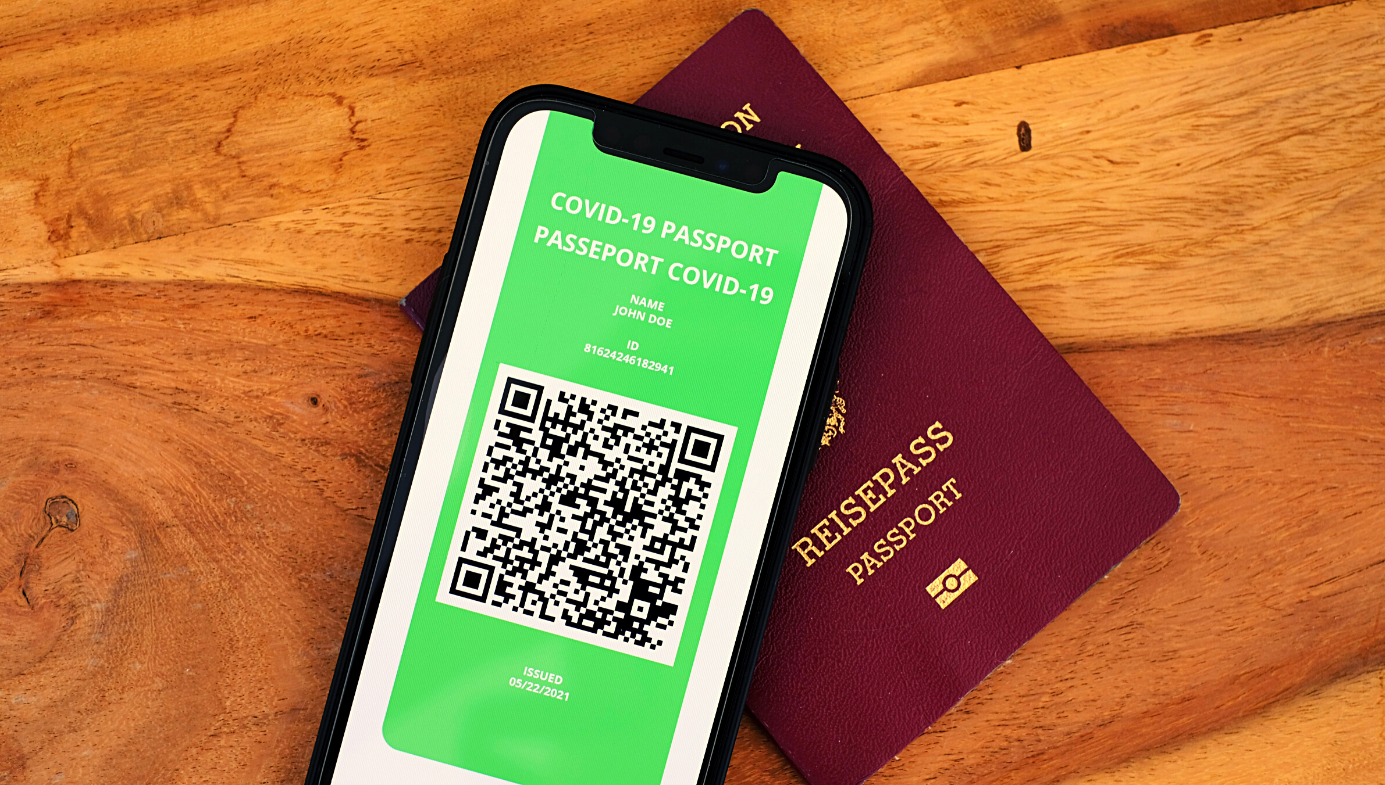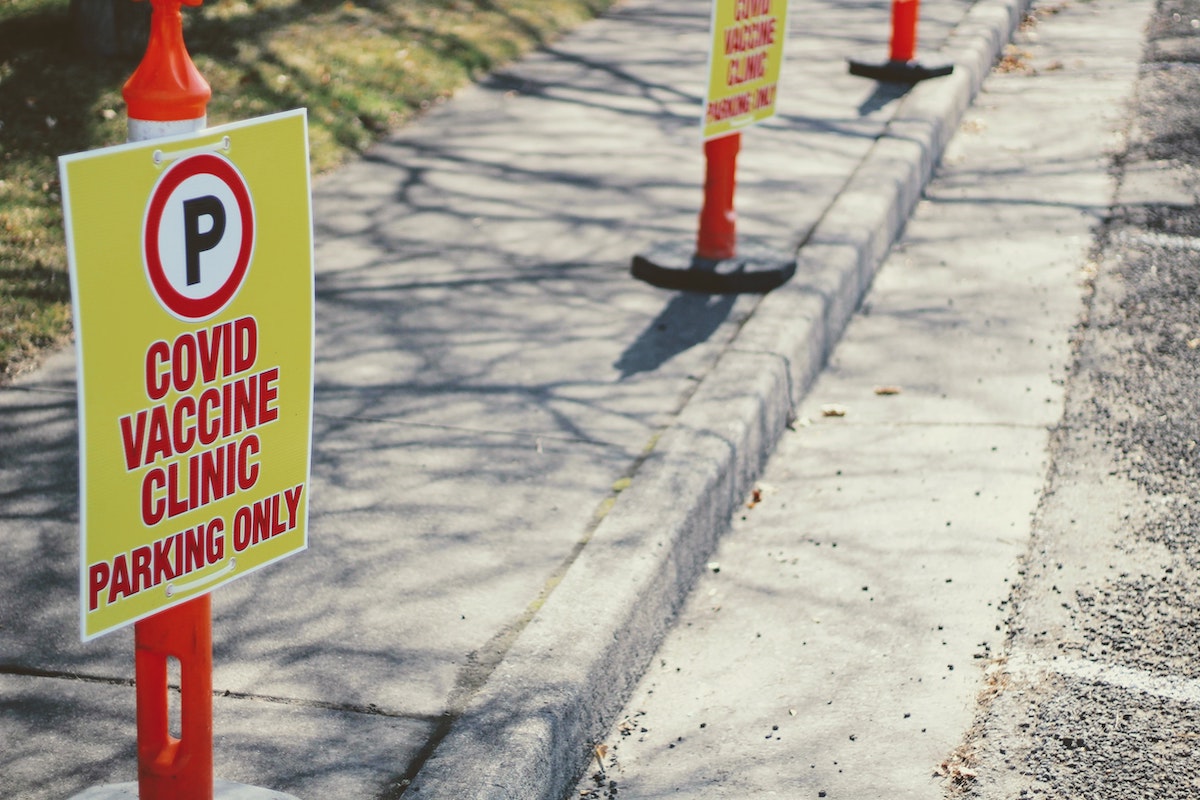Editorial
Making the (Conservative) Case for Vaccine Passports
In many parts of the world, the anti-vaccination cause is now closely associated with the right-leaning side of the political spectrum.

According to the latest Centers for Disease Control and Prevention data, at least 171 millon people in the United States have been fully vaccinated against SARS-CoV-2, the virus that causes COVID-19. Of these individuals, 2,063 (0.0012 percent, or about one in 83,000) are known to have later died while being infected. But even this extremely low number understates the protective value of vaccines, because more than 20 percent of these vaccinated individuals were asymptomatic upon their death. And notwithstanding sensationally reported anecdotes involving young vaccinated people succumbing to the disease, 87 percent of the fully vaccinated Americans who’ve died from COVID-19 were aged 65 or older. As a recent Heritage Foundation analysis showed, the average fully vaccinated American is more likely to die from drowning, being shot, or choking on food than from COVID-19.
We have all seen articles and videos that highlight the real and supposed dangers associated with COVID-19 vaccines. And it is true that, as with many life-saving medical products, there are potentially dangerous side-effects for some groups, including a risk of heart problems in young men who have received Pfizer or Moderna shots. But the latest data amalgamated from US hospitals shows that these risks are small, and that the available vaccines continue to provide robust protection against COVID-19, including its delta variant. Certainly, on balance, the vaccines are many orders of magnitude less dangerous than COVID-19 itself. Meanwhile, drugs that once were presented as hoped-for alternatives to vaccines—ivermectin, most notably—have shown little or no promise in high-quality studies. And some patients who’ve followed the advice of self-styled health experts have suffered dangerous adverse reactions.
Given the documented benefits of COVID-19 vaccines, why are so many public health authorities having difficulty getting people vaccinated? No OECD country has yet surpassed an 80 percent full-coverage rate, and only a few have passed 70 percent. The United States, shockingly, has barely passed 60 percent, despite having had a glut of vaccines available for months.
In a detailed survey of Canadians who describe themselves as either “hesitant” or outright opposed to getting vaccinated, a variety of rationales were articulated, ranging from outright conspiracy theories (“COVID [is] a hoax”), to fear of discomfort (“I hate needles”), to a preference for “natural” cures. But by far the most commonly given reasons were rooted in distrust of government, as with “I hate government telling me what to do,” or the claim that deadly risks associated with the vaccines are being “covered up.”

Unfortunately, the problem of distrust in government (and its associated public-health apparatus) isn’t one that can be solved with a one-off public-awareness campaign during a pandemic. In the 1960s, when the first measles and mumps vaccines were being rolled out, more than 70 percent of Americans were telling pollsters that they “trusted the federal government to do the right thing almost always or most of the time.” By 2019, that figure had dropped all the way to 17 percent. And so the idea that vaccine proponents can win the argument with anti-vaxxers merely by designing the right bus-shelter posters, footnoting the right peer-reviewed studies, or delivering the right zingers in social-media arguments, is misguided. In some cases, strident rhetoric exhorting people to get vaccinated may even encourage the sense of underlying distrust that animates many vaccine-hesitant individuals.
Nor do we advocate national policies that force people to get vaccinated. Reasonable people can disagree on how far an unvaccinated person’s right to freedom of movement, commerce, and education can be extended without unduly compromising the right of others to protect their health. But at the very least, the presumption of personal bodily autonomy should extend to a mentally capable adult’s right to avoid unwanted medical interventions—including vaccines—so long as he or she behaves in a way that doesn’t put others at risk.
But some systematic means must be implemented to distinguish those who opt in from those who don’t, as one’s vaccination status (unlike mask usage and social distancing) isn’t discernible to third parties except by reference to otherwise private medical documentation. This is why, in recent months, many of us have spent so much time procuring, scanning, e-mailing, and uploading proof of vaccination to all manner of recipients, from schools and summer camps to employers and government agencies. In some countries, such as Canada, these documents are even required to move between certain regions.
As a means to create a uniform informational standard, many jurisdictions are setting up centralized “vaccine passport” databases (though they don’t always go by this name; and the word "passport" is something of a misnomer, as such systems are not, as yet, used to regulate international travel). In the Canadian province of Quebec, this takes the form of a quick response (QR) code that a person can flash from a phone to a participating service operator. A somewhat similar system will be implemented in the neighboring province of Ontario, where Premier Doug Ford had initially rejected the plan on the basis that it would create a “split society.” Ford changed his mind when it became clear that this was as much about economic necessity as public health. Toronto is home to five major professional sports teams, all of whose venues will require a quickly accessible means of testing fans’ vaccination status upon admission. A system that involves scanning a code from a phone obviously is preferable to one that requires service attendants to rifle through tens of thousands of fans’ (easily falsifiable) personally curated medical documentation.
In many parts of the world, the anti-vaccination cause is now closely associated with the right-leaning side of the political spectrum. And so it’s important to note that a strong commitment to mass vaccination isn’t necessarily inconsistent with traditional conservative principles. The pandemic has generated a massive increase in government spending in all advanced economies, as well as a thicket of public-health rules that restrict our freedoms in almost every area of life. The quickest way to roll back this unprecedented expansion of peacetime governmental power is to take private steps that help eliminate its pathogen-borne raison-d’être.
Excepting the most ideologically committed libertarians, moreover, conservatives generally will concede that governments have a proper role in creating and enforcing the various systems of standards and accreditation on which all private actors depend to protect their property, livelihood, and personal safety. We trust government officials to issue driver's licenses and passports, mint currency, indicate uniform systems of weights and measures, maintain property registers, and ensure proper labelling of medicines and foods. A system of vaccine passports is in keeping with these widely accepted government functions. Indeed, vaccine registries have existed for generations, in some form, as a means to ensure schoolchildren are protected from mumps, measles, rubella, and other diseases.
Ontario's new system, which takes effect September 22, will cover non-essential services such as gyms and indoor dining. But it is absolutely true that, once adopted, a system of vaccine passports could be leveraged as a means to enforce unacceptably draconian measures—such as, say, a rule that barred unvaccinated citizens from voting or using public transit. (Such concerns aren’t merely hypothetical: One Ontario judge already has ruled that unvaccinated individuals cannot sit on his juries—a decision we find objectionable.) But it is also true that a universally adopted system of vaccine passports could help empower private actors to adopt their own more flexible health standards, free of government diktat.
Passport skeptics have emphasized that vaccinations alone cannot entirely prevent a person from becoming stricken with COVID-19 (even if they greatly reduce the chance that such an infection will lead to hospitalization or death), or from communicating the disease to others. But even so, your vaccination status is important to the people around you, because vaccinated individuals are substantially less likely to be infected, and so, on a statistical basis, are less of a threat to spread the disease.
There is a libertarian alternative to vaccine passports, of course, which is to have small businesses, schools, sports leagues, churches, movie theaters, and the like all design and implement their own idiosyncratic systems of vaccine-status verification. But most such organizations are not well-equipped for this kind of task (let alone for storing and accessing personal medical information in a way that complies with applicable privacy legislation).
Moreover, the implementation of a vaccination-passport system could allow governments to drop one-size-fits-all public-health protocols that have been formulated with respect to the highest-risk (i.e., unvaccinated) component of the population. That's because employers, school board officials, entrepreneurs, and civic leaders would now be armed with the individualized information they need to tailor their policies to the constituencies they serve. Many employers, for instance, are choosing to let vaccinated and unvaccinated workers alike work in offices (so long as they follow otherwise applicable public-health measures, including the use of masks), while large-scale corporate conferences and other mass-attendance professional events are more likely to require attendees to be vaccinated.
Likewise, a clear-cut passport system would allow individual citizens more transparency about what they are, and are not, giving up by refusing to get vaccinated. A dedicated anti-vaxxer, for instance, may be willing to give up the non-essential services covered by a passport system—and perhaps even negotiate a work-from home arrangement, or seek a new job entirely, as a means to avoid submitting to vaccination. In regard to commercial and corporate interactions, likewise, customers, suppliers, and contractors would all be able to use a passport system to benchmark their own decisions. The necessity to submit to such trade-offs would remain politically contentious among anti-vaccination activists, of course. But at least the choices at play would be theirs to make.
Such a devolution in decision-making from government to private actors isn’t just a good way to rationally match public-health rules to local risk levels: It could even help encourage more people to get vaccinated—since anti-vaxxers who distrust faceless government bureaucrats may take a more sanguine view toward the vaccine requirements set by trusted co-workers, educators, neighbors, fellow religious congregants, and other people in their personal orbit.
Or, in other cases, these vaccine skeptics may submit to vaccination merely as an expedient to keep their jobs, or to continue accessing some prized service or amenity, all while continuing to voice their political opposition. In France, for instance, a “health pass” mandate imposed on workers with public-facing service jobs has correlated with a significant uptick in vaccinations vis-à-vis other EU nations. And in Ontario, vaccine bookings more than doubled on the day that the province announced its new certification system.

But whatever the motivations at play, each person should be free to weigh the (substantial) benefits of vaccination against what they perceive to be its drawbacks. A government’s job is to make COVID-19 vaccines available, encourage their use, and reliably index the identity of those who choose to get them. And the faster that list grows, the faster we will put this pandemic behind us.
September 7, 2021 correction: The original version of this article included the incorrect assertion that "according to Mississippi’s health department…a majority of incoming calls to the state’s poison-control center now originate with patients who’ve taken ivermectin tablets intended for barnyard animals." This statement was sourced to an erroneous Associated Press news report, which in turn had been sourced to erroneous information provided by state health-department officials. We regret the error.






